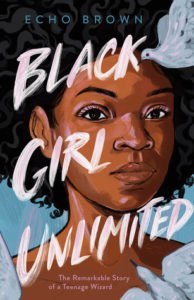
There seemed to be some debate about whether Black Girl Unlimited was fantasy or a memoir, but the first reviews were almost universally glowing, and early March was a good time to read some promising 2020 publications before award nominations were due. So I thought I’d give Echo Brown’s debut a shot, and I’m glad I did.
Black Girl Unlimited follows Echo from age six through the end of high school, as she tries to navigate the pain surrounding her growing up on Cleveland’s East Side while simultaneously learning how to be a wizard. Yep, a wizard.
The narrative is highly autobiographical, and after the first couple chapters told of learning to transport somewhere else during traumatic events, it felt like the magic was going to be all metaphor. But then there was more: wizards performed multiple miracles confirmed by multiple witnesses. So it was real. But even when the wizardry became concrete and undeniable, the book still felt more like magical realism than urban fantasy. The difference is fuzzy and may be more tonal than anything about content, but this is a story that’s firmly rooted in the real world—albeit with partially-explained magical events interspersed throughout—as opposed to a story of a magical world that bears superficial similarity to the real world.
There is plenty of pain in Echo’s life—most of it occurring on page—and there are times that the sheer volume of trauma can have a dulling effect on the reader. But Brown counters this by frequently splitting scenes into two, where a paragraph will cut off mid-sentence and transition to an entirely different scene, with that scene progressing a little while and then cutting in mid-sentence back to the first, and so on. It wasn’t always clear whether this was meant to be an artifact of wizardry or associations in Echo’s mind or just a literary device, but those scenes were often the most powerful, with the cuts back and forth signaling significance and snapping the reader back to attention. And, while it was disorienting the first time, Brown limited the scene-hopping to two at a time, and so it never really made the narrative difficult to follow.
Ultimately, Black Girl Unlimited centers hope and overcoming hardship. So while the pain can be overwhelming at times, it doesn’t ultimately overwhelm, and Echo’s life at 18 is better than one might’ve expected based on what they saw from her life at six. Similarly, while her journey has many painful moments, it isn’t just a parade of one dark event after another, reading more like a memoir than a focused coming-of-age. Despite coming in under 300 pages, it makes room for a variety of slices of Echo’s life, from watching Spades games and dancing to attending church services to exploring her sexuality to going out in a field with her friends and looking at the sky.
Black Girl Unlimited is a moving memoir with fantastic elements presented in the style of magical realism. As someone whose stylistic preferences lean more towards fantasy and tighter narrative focus, it probably didn’t hit me as hard as it might another reader who prefers a different style. But at the same time, the story never drags, and double-scene chapters had real power behind them. Overall, it was a good one.
Recommended if you like: memoirs, magical realism, stories of overcoming trauma, deep real-world grounding.
